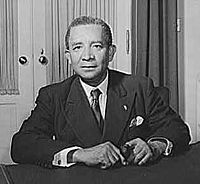Edwin Barclay
| Edwin James Barclay | |
|---|---|
 |
|
| 18th President of Liberia | |
|
In office December 3, 1930 – January 3, 1944 |
|
| Vice President | James Skivring Smith, Jr. |
| Preceded by | Charles D.B. King |
| Succeeded by | William V.S. Tubman |
| 19th Secretary of State | |
|
In office January 5, 1920 – December 3, 1930 |
|
| President | Charles D.B. King |
| Preceded by | Charles D.B. King |
| Succeeded by | Louis Arthur Grimes |
| Personal details | |
| Born | January 5, 1882 |
| Died | November 6, 1955 (aged 73) |
| Political party | True Whig |
Edwin James Barclay (January 5, 1882 – November 6, 1955) was a Liberian politician. A member of the True Whig political party, which dominated the political governance of the country for decades, Barclay served as the 18th President of the country from 1930 until 1944. Under his leadership, Liberia was an ally of the United States during World War II.
Edwin Barclay's paternal grandparents moved from Barbados to Liberia with their children in 1865. They were among a minority of immigrants from the Caribbean but shared with the Americo-Liberians a culture with an English base, considerable mixed-race ancestry, and a shared history. Edwin's father, Ernest Barclay, and uncle, Arthur Barclay, became important politicians in Liberia.
In 1901, at the age of 19, Edwin wrote a Liberian patriotic song, "The Lone Star Forever." Barclay and his wife Euphemia had three children. In addition, they fostered George Arthur Padmore (1915-2005). He became the Liberian ambassador to the US.
Children:
Edwin Barclay, a member of the True Whig Party which ruled at that time, served as foreign minister and secretary of state of Liberia in the government of Charles D.B. King from 1920 until 1930. He became President of Liberia in 1930 when President King and Vice President Allen Yancy resigned because of a scandal. He was elected in his own right for the first time in 1931.
Barclay was selected to complete King's term as president. One of his first official decisions was to repeal the famous Port of Entry Law of 1864 that had restricted the economic activities of foreigners in the country. Subsequently, in the early 1930s concession agreements were signed between the Liberian Government and Dutch, Danish, German and Polish investors. Barclay is credited with helping the country survive some of Liberia's greatest threats to its sovereignty in that country's history. These included threats by the League of Nations led by Germany, the United Kingdom and the United States to recolonize the country unless reforms were made, aggressive actions by France and a coup attempt by the Firestone Tire and Rubber Company which owned much of Liberia's land.
...
Wikipedia
